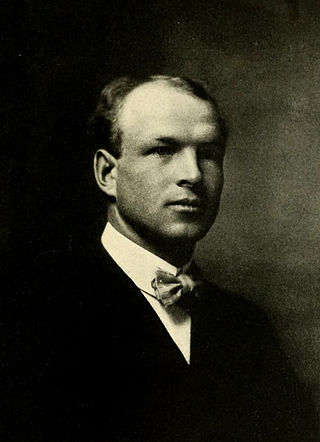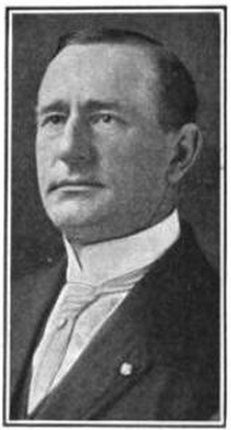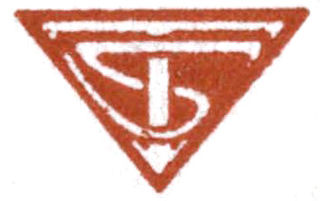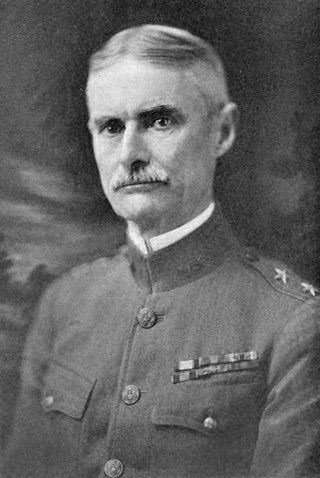Robert Mountsier (1888-1972) was an author, journalist and literary agent for writer D. H. Lawrence. [1]
Contents

Robert Mountsier (1888-1972) was an author, journalist and literary agent for writer D. H. Lawrence. [1]

Mountsier was born in Belle Vernon, Pennsylvania, on May 14, 1888, the son of Augustine R. Mountsier of Hilgay, England. [3]
In 1905, Mounstier, as a high school student, placed second in a competitive examination to be accepted as a plebe in the U.S. Naval Academy at Annapolis, Maryland. [4]
He graduated from the University of Michigan in 1909 and received a Ph.D. from Columbia University. [1] In a 1910 passport application, he described himself as a "student and journalist." He was a resident of Livingston Hall on the Columbia campus. [5]
In his later life he lived in Crestwood, New York, and died at the age of 84 on November 23, 1972, in a New York City nursing home. He was survived by siblings Carl Mountser, Mabel Mountser and Alathea Walker. [1]
Mountsier joined the New York Sun as literary editor in 1910 and was aviation and automobile editor from 1914 to 1916. In the latter year, he was reporting from the Mexican border, and in World War I he was sent to Europe by the New York Herald. Afterward, he was employed by the Red Cross and was also with the American Relief Administration. [1] [3] [6]
He was also the literary editor of Judge (magazine) in 1915 under the name A. Robert Mountsier. [7]
Between 1916 and 1919 he was in England, France, Turkey and Armenia. In 1920 he returned to Europe on a commercial assignment to investigate business conditions "with special reference to the copper and brass industries." [2]
After the war Mountsier returned to the Sun. In 1929 he covered a 140-day around-the-world voyage of the Hamburg-American Line Resolute. The Sun closed in 1950, and afterward he edited an automotive magazine, Old Timers [1] [8] for the Automobile Old Timers organization in New York City. [9]
Mountsier was also the American literary agent for writer D. H. Lawrence, beginning in October 1920. [1] [10] Lawrence broke with his previous agent, J.B. Pinker, and replaced him with Mountsier in New York and Curtis Brown in London. [11]

Richard Aldington was an English writer and poet. He was an early associate of the Imagist movement. His 50-year writing career covered poetry, novels, criticism and biography. He edited The Egoist, a literary journal, and wrote for The Times Literary Supplement, Vogue, The Criterion, and Poetry. His biography, Wellington (1946), won the James Tait Black Memorial Prize.

Harold Witter Bynner, also known by the pen name Emanuel Morgan, was an American poet and translator. He was known for his long residence in Santa Fe, New Mexico, and association with other literary figures there.

Gustav Kobbé was an American music critic and author, best known for his guide to the operas, The Complete Opera Book, first published (posthumously) in the United States in 1919 and the United Kingdom in 1922.

William Peterfield Trent, LL.D., D.C.L. was an American academic and the author/editor of many books. He was a professor of English literature at Sewanee: The University of the South and Columbia University. While at Sewanee, he founded the Sewanee Review in 1892, a literary journal that continues to operate.

Tarleton Hoffman Bean was an American ichthyologist.

Mark Antony De Wolfe Howe Jr. was an American editor, author, and the recipient of the 1925 Pulitzer Prize for Biography or Autobiography.

William Frederic Ritschel, also known as Wilhelm Frederick Ritschel, was a California impressionist painter who was born in Nurenberg, Kingdom of Bavaria.

Robert Roswell "Buster" Brown was an American football player, coach of football, basketball, and baseball, and college athletics administrator. After playing college football at Dartmouth College, he coached football teams at Virginia Tech, North Carolina, Washington and Lee, and Tulane. In 1910, he moved to Roswell, New Mexico, where he served for more than 25 years as the football coach and athletic director at the New Mexico Military Institute.

Charles Otis Bemies was an American football, basketball, and baseball coach and Presbyterian minister. He became acquainted with James Naismith while studying at Springfield College in the late 1880s. While serving as the athletic director at Geneva College, he organized the first college basketball team in 1892. He graduated from the Western Theological Seminary and was ordained as a Presbyterian minister in 1897. From 1899 to 1901, he served as the first basketball and second football coach at Michigan Agricultural College. After retiring from coaching, Bemies served for many years as a Presbyterian minister and evangelist in rural Pennsylvania. He was also active with YMCA, serving with that organization in Russia in 1918 and in South Dakota in the early 1920s. Bemies lived in Minneapolis, Minnesota, in his later years and died there in 1948. He was posthumously inducted into the Beaver County Hall of Fame in 1992.

Thomas Seltzer was a Russian-American translator, editor and book publisher.

William Howard Hoople was an American businessman and religious figure. He was a prominent leader of the American Holiness movement; the co-founder of the Association of Pentecostal Churches of America, one of the antecedent groups that merged to create the Church of the Nazarene; rescue mission organizer; an ordained minister in the Church of the Nazarene, and first superintendent of the New York District of the Church of the Nazarene; YMCA worker; baritone gospel singer; successful businessman and investor; and inventor.

Rossiter Johnson was an American author and editor. He edited several encyclopedias, dictionaries, and books, and was one of the first editors to publish "pocket" editions of the classics. He was also an author of histories, novels, and poetry. Among his best known works was Phaeton Rogers, a novel of boyhood in Rochester, New York, where Johnson was born.
The Solicitor of the Treasury position was created in the United States Department of the Treasury by an act of May 29, 1830 4 Stat. 414, which changed the name of the Agent of the Treasury.
Eugene Ruppert "Jack" Veiock, sometimes known as "J.R.", was an American sportswriter and editor. He was the sporting editor of the International News Service from 1916 to 1921.
Lawrence Marston was an American actor, playwright, producer, stage director and film director.

Nina Evans Allender was an American artist, cartoonist, and women's rights activist. She studied art in the United States and Europe with William Merritt Chase and Robert Henri. Allender worked as an organizer, speaker, and campaigner for women's suffrage and was the "official cartoonist" for the National Woman's Party's publications, creating what became known as the "Allender Girl."

William Henry Hay was a United States Army officer who attained the rank of major general as the commander of the 28th Division in the final days of World War I.

Homer Clyde Snook was an American electrical engineer and inventor. He developed the Snook apparatus, the first interrupterless device produced for X-ray work.

James Mackintosh Kennedy was a Scottish-American poet, editor, and engineer.